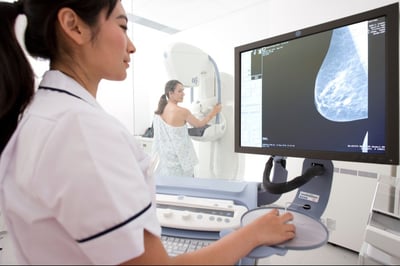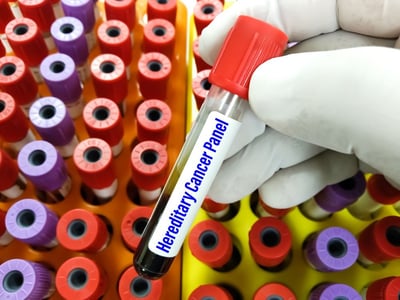Hereditary Cancer



Relevance: Medium-High
Most relevant for: People who are at increased risk for stomach cancer due to an inherited mutation.
Study: H. pylori bacteria infection and risk of stomach cancer in mutation carriers
The results of a study in Japan show that people with a bacterial infection called H. pylori and an inherited mutation in an ATM, BRCA1, BRCA2 or PALB2 gene have a high risk of stomach cancer. (Posted 1/19/24)
Este artículo está disponible en español.
READ MORE ›


Relevance: Medium-High
Most relevant for: People with an inherited BRCA1 or BRCA2 mutation
Study: Benefit of pancreatic cancer screening
Among people with an inherited mutation in a BRCA1 or BRCA2 gene, screening for pancreatic cancer found most cancers at an earlier stage when they could be treated by surgery. Posted 1/17/24)
Este artículo está disponible en español.
READ MORE ›


Relevance: Medium-High
Most relevant for: People diagnosed with endometrial cancer
Study: Genes, genetic counseling and disparities in endometrial cancer
Endometrial cancer is on the rise, and it can run in families. Genetic counseling has benefits for people with cancer and their family members. However, Black women with endometrial cancer more often have worse outcomes than white women. Black women with endometrial cancer who test positive for an inherited mutation are less likely to see a genetic counselor. Given these disparities, Black women would benefit from better access to and referrals for genetic counseling. (Posted 12/14/23)
Este artículo está disponible en español.
READ MORE ›


Relevance: Medium
Most relevant for: Transgender women with inherited mutations who are considering or have had gender affirming care
Article: Breast cancer risk for transgender women with inherited mutations
There has been little research on breast cancer risk for transgender women who are at high risk for breast cancer due to an inherited mutation. This review summarizes what we know. (Posted 11/29/23)
Este artículo está disponible en español.
READ MORE ›


Relevance: Medium-High
Most relevant for: People interested in the use of artificial intelligence in medicine
Article: Artificial intelligence (AI) may find breast cancer on mammograms sooner
Artificial intelligence (AI) tools may help doctors read mammograms. This assistance may lead to earlier diagnoses of breast cancer. (Posted 9/29/23)
Este artículo está disponible en español.
READ MORE ›


Relevance: High
Most relevant for: People interested in genetic testing.
Article: Genetic testing and the future of medicine
An article published in Katie Couric Media discusses genetic testing and how it can impact health. The author talked with Dr. Robert Steiner, a doctor who specializes in genetics. He talked about genetic testing and how the results can affect health and change lives. (Posted 9/28/23)
Este artículo está disponible en español.
READ MORE ›


Relevance: Medium-High
Most relevant for: People with metastatic castration resistant prostate cancer with a mutation in BRCA1 or BRCA2
Update: New drug combination for early treatment of some metastatic prostate cancer
The FDA approved Lynparza (olaparib) for use earlier in treatment of metastatic castration-resistant prostate cancer (mCRPC) when added to abiraterone and prednisone for people with a BRCA mutation found through genetic or tumor testing. Lynparza combined with hormone therapy may now be used as a first-line or later treatment. (Posted 9/11/23)
Este artículo está disponible en español.
READ MORE ›


Relevance: Medium-High
Most relevant for: Young adults
Topic: Colorectal cancer is on the rise in young adults: What Millennials and Gen Zs need to know
The rate of colorectal cancer among young adults in the US has been increasing since the 1990s. Scientists are trying to figure out why. (Posted 8/15/23)
Este artículo está disponible en español.
READ MORE ›


Relevance: Medium-High
Most relevant for: People who are not at high risk of ovarian cancer who are having pelvic surgery
Topic: Reducing ovarian cancer risk without removing the ovaries
A leading ovarian cancer organization has recommended that all women who have pelvic surgery should also consider removing their fallopian tubes to reduce their risk of ovarian cancer. (Posted 7/18/23)
READ MORE ›


Relevance: Medium-High
Most relevant for: People who have mammograms
Guideline: What is breast density and why does it matter?
New FDA guidelines for mammograms will go into effect by September 2024. Current FDA guidance requires hospitals and breast centers to give people information about their breast density with their mammogram results. By September 2024, mammogram providers will need to relay to patients who have dense breast that they should discuss the need for additional imaging. This article provides an overview of what breast density means and why it matters. (Posted 6/8/23)
Este artículo está disponible en español.
READ MORE ›